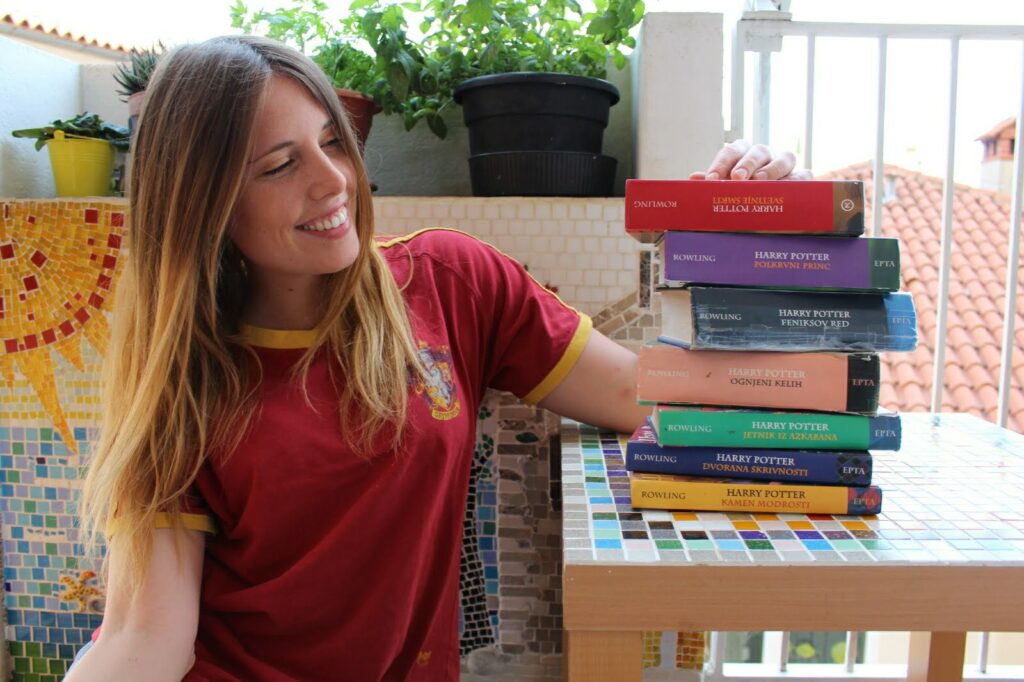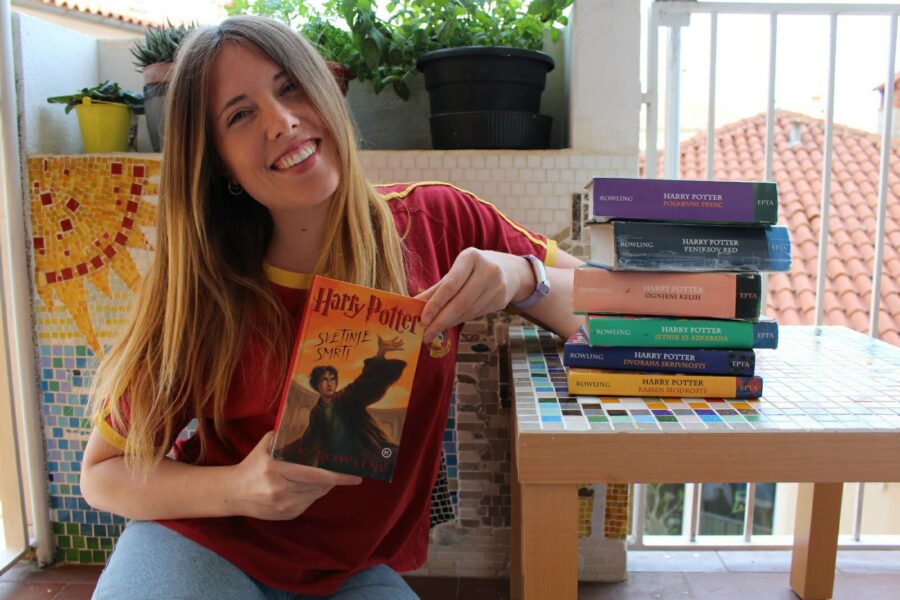“It does not do well to dwell on dreams and forget to live.”
(This blog post contains unhidden spoilers.)
Harry Potter and I
Harry Potter has been with me for as long as I can remember. When the Philosopher’s Stone was translated into Slovenian, I was only six years old. My mom started reading it to me a little bit later, and I soon became hooked and started reading the books on my own. I would impatiently wait for a new book to come out, run to the bookshop the same day and start reading it on the street. I’d fantasise about becoming friends with Harry, Ron and Hermione. I’d re-read the books time and time again. When the Chamber of Secrets came out, my mom had to take me to the cinema multiple times. I was obsessed with the story and in love with the characters.
The last film came out when I was seventeen, and after that Harry and I kind of went on a break. I’d still watch some of the films every now and then when they were on TV, but I don’t think I touched the books again until a few years ago. I did read The Cursed Child when it came out; I sort of liked it and sort of didn’t. I haven’t even watched The Fantastic Beasts yet because I can’t make myself watch anything Harry Potter-related that doesn’t contain Harry (and Ron and Hermione).
Audio books
A few years ago, a friend told me about this wonderful website where you can listen to the audio versions of all the books read by Stephen Fry. He really did an incredible job: he sounds just like Hagrid and Dumbledore. He nailed the accents and even did well with the female voices. His voice accompanied me on my runs and walks for months after I discovered this website. I walked through half of Moscow, where I lived at the time, with Fry in my ears and the Hogwarts trio in my mind.
The series as a whole
What is there to say when it comes to the Harry Potter series? It influenced a generation and it created an army of fans. These books can be enjoyed by kids, teens and adults alike, even though they’re only meant for the first two age groups. I laughed, cried, and was angry and anxious along with the characters. Reading these books (with a piece of chocolate in my hand) was my favourite thing to do when I was a kid. I’m sure I’ll read them again; if not before, then to my kids someday.

Harry Potter and the Philosopher’s Stone
The first book gets you hooked. Even though it begins with Harry’s miserable situation at the Dursleys, it quickly introduces the magical world and Harry is saved from his dreadful relatives by Hagrid. I love how close to the muggles the wizarding world seems to be, how thin the boundary between everyday London and the train to Hogwarts is.
Another thing that makes the story easy to relate to is the fact that the main characters may be wizards, but they’re also regular 11-year-olds who bicker and break school rules. The friendship between Harry, Ron and Hermione, established after the fight with the troll, is what I loved the most throughout the books. In The Philosopher’s Stone, it’s proved by Ron and Hermione sticking by Harry’s side and helping him get the stone. The Philosopher’s Stone is the perfect introduction to the story and the rest of the books.
Harry Potter and the Chamber of Secrets
The second book is made interesting by the appearance of Professor Lockhart who represents a couple of the many vices of adults. Throughout the book, there’s also the mysterious notion of the chamber and the monster. The fact that Harry discovers that he’s a Parselmouth, hears the Basilisk through the walls and that people are petrified makes the second book darker and scarier than the first one. Harry ends up being the hero again, saves Ginny and successfully fights Voldemort. There seems to be a pattern in both books: mysterious things happening throughout the books, the trio suspecting the wrong people and then something happening towards the end of the school year. Both books end with Harry, Ron and Hermione bravely taking it upon themselves to save something or someone, and Harry ultimately ends up as the hero.
Harry Potter and the Prisoner of Azkaban
Now, this is something else: The Prisoner of Azkaban is very different from the previous two books. The three characters are clearly teenagers now, which is shown in the film brilliantly. There are many new elements introduced in the third book: dementors, Hagrid becoming a teacher and Harry finding out about the existence of Sirius Black. Harry sees death everywhere: in the Grim, in the stories on Black in the newspapers, in the dementors and during Trelawney’s classes. He falls off his broom during Quidditch, and everything seems to be a bit too much for a thirteen-year-old, but Rowling manages to mix in enough humour to make it bearable. Professor Lupin is a brilliant addition to the plot, especially because he used to be so close to Harry’s father.
The book ends with a wonderful plot twist, and for the first time since he was a baby, Harry has a fatherly figure in his life. The fact that Sirius is forced to hide because Pettigrew escapes is quite infuriating, but Rowling sort of makes up for it in the last book. The third book is definitely one of my favourites. Rowling changed things up a bit: Voldemort didn’t try to make a comeback and the story didn’t follow the plotline of the first two (even though the big event happened at the end again, but that’s how it has to be if we want to see what happened at Hogwarts throughout the year). Most importantly, Harry got to know all of his father’s friends and found out what they used to do at Hogwarts.
Harry Potter and the Goblet of Fire
As the characters are growing up, their circumstances are becoming even darker. The Goblet of Fire is heavier than the first three books in many senses: it’s a lot longer, Harry witnesses Cedric’s death and Voldemort comes back. The international vibe of the fourth year at Hogwarts makes the books special, as do the sparks of attraction and anger flying between Ron and Hermione, and the fact that Ron can’t contain his envy of Harry. The Quidditch World Cup and the Triwizard Tournament are wonderful events which show how wizards act in public and when they meet foreigners. Wizards are very similar to muggles when it comes to this.
Once again, Harry seems to be in danger all the time and is put in positions he doesn’t want to be in. I found the graveyard scene particularly painful to read, and perhaps that’s why I loved the third book more than the fourth. In the third, Harry gained Sirius, while in the fourth, he had to witness a colleague die and his biggest enemy come back to life, putting him in everyone else in great danger. There’s no denying that the fourth book is entertaining and that I read it several times, though.

Harry Potter and the Order of the Phoenix
If the Goblet of Fire is dark, the Order of the Phoenix is darker. If Harry was seen as a cheat in book four, he’s seen as a liar and a lunatic in book five by many classmates, parents and especially politicians. It’s not an easy period for him, and the arrival of Dolores Umbridge naturally only makes it worse, as does the fact that Dumbledore refuses to speak to him. On the other hand, the trio successfully establishes Dumbledore’s Army. Harry proves to be great at the defence against the dark arts and at teaching. What also makes the book lighter is the fact that Harry gets his first kiss and starts dating Cho Chang.
None of the happy moments in book five can delete the memory of the events at the ministry, though. Sirius’s death is terrible for so many reasons. The two might not have been able to spend much time together, but Sirius meant so much to Harry and Harry meant so much to Sirius. The presence of the other somehow filled the empty hole that James left behind. It was cruel that the closest thing to a parent Harry ever had was taken away from him so soon and that he blamed himself for it. I understand why Rowling did it, but it was still painful to read.
Harry Potter and the Half-Blood Prince
The sixth book is one of my favourites because it’s the last one taking place at Hogwarts, because I’m a sucker for romance and because Harry finally figures out what he has to do. Professor Slughorn is a nice addition to the story as is Felix Felicis, which he brings into the picture. I was always rooting for Ron and Hermione and really enjoyed the whole Lavender period. Harry’s gradual falling for Ginny was also amazingly described (even though the film ruined it big time).
Using spells from the Prince’s book was at the same time exciting and scary, as were Harry’s and Dumbledore’s trips to the past. After a year of silence, it was wonderful to see the two connect again. The ending of the fifth part is sad, but Harry’s determination makes it full of hope too. Another one of Harry’s fatherly figures, the one who he looked up to the most, dies. He’s only sixteen and he must end the most dangerous wizard of all time. To do that, he has to leave his girlfriend, his school and his friends – just that Rony and Hermione disagree.
Harry Potter and the Deathly Hallows
The last book is very different from the rest because most of it takes place away from Hogwarts. I love the Hogwarts vibe: the students, the professors, the ghosts, the food, the history, the mysteries. It makes sense for the three to be away from it, though, and their adventures make up for the absence of the castle. The fight between Harry and Ron was necessary and the logical outcome after Ron’s jealousy in book four. How Harry and Hermione felt his absence was fantastically presented, as was Hermione’s anger and Harry’s forgiveness when he came back. It only makes sense that their search ends in Hogwarts where they are helped by colleagues, professors, parents and Aurors alike.
It was hard for me to accept the deaths of Lupin, Tonks and Fred, even though it’s only logical that people die in wars, and this is exactly what the fight against Voldemort and the Death Eaters was. With Lupin’s death, Harry loses yet another fatherly figure. He is also the last creator of the Marauder’s Map to die. This way, Harry faces Voldemort for the final time alone, without any parental figure by his side. Lupin and Tonks just had a child, and just like Harry, Teddy is left parentless. And to imagine George without Fred? Impossible. What shocked me the most was naturally the fact that Snape was a double agent and that Dumbledore was right after all. This must be the best plot twist I’ve ever read, and Snape is one of my favourite characters ever. His story is so depressing if you think about it too much but also so so interesting.
What I love the most about the HP series:
the friendship between Harry, Ron and Hermione
that being great doesn’t mean being perfect: Dumbledore is proof of that
that appearance lies: Snape
that love is the strongest force in life: Snape who loved Lily until the day he died and risked his life on multiple occasions because of his love for her, Harry who left Ginny to protect her, Ron and Hermione who loved each other despite how different they were, Lily who protected Harry with her love, Harry, Ron and Hermione who stood by each other through absolutely everything
the bravery that many characters showed, especially Harry and Snape
the witty names of certain characters
the description of the castle and its grounds
the humour, especially in various teacher-student situations
the magical creatures
the wonderful spells
McGonagall’s authority
Snape’s snide comments
It’s hard to say which book from the series is my favourite. I think that as a child I loved the third one the most. When I was older, I loved the sixth book, but I think the seventh book is so important because of the war and because of Snape, of course. It’s impossible to decide, so I won’t think about it too much. I won’t dive into plot holes either because this post is about what I love. Also, this are, after all, and even though they can definitely be enjoyed by adults, books for children. As a child, I didn’t notice any plot holes at all.
If you want to read about my other favorite book series, click here.





2 Comments